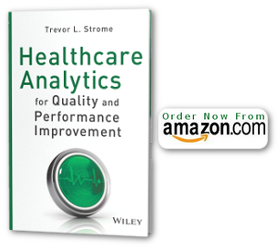In my role as a healthcare analytics and quality improvement (QI) professional (and, now an Assistant Professor with the local College of Nursing), I find myself regularly in discussions with nursing professionals regarding how analytics and QI impact their roles. A common thread in these discussions revolves around why, how, and where nurses should learn about data analytics and quality improvement, on top of their already extensive clinical skills.
I am a very strong proponent of continuous QI and analytics training throughout one’s career (for example, pursuing Lean or Six Sigma Black Belt certifications) as well as exposure to these important concepts early in one’s professional training (such as at the undergraduate and graduate levels) .
There are several key reasons why analytics and quality improvement are very relevant to nurses throughout all stages of one’s career:
- Nurses’ jobs are impacted by QI and analytics. QI initiatives using methodologies such as PDSA, Lean, and Six Sigma are perhaps the main driving forces behind process and workflow changes in healthcare. Many of these processes and workflows being measured (via analytics) and redesigned (using Lean) are performed by nurses (since nurses form a sizable contingent within the healthcare workplace), and within innovative healthcare organizations, very few such processes are left untouched.
- Nurses form the bulk of quality improvement initiative teams. Because QI initiatives are driving changes to nursing workflows, nurses are frequent and necessary participants on QI teams. The subject matter expertise that nurses bring to QI teams is invaluable, and can make the difference between achieving actual improvements in quality, safety, and efficiency versus poorly thought-through “innovations” that turn out to be disastrous to patient safety and staff performance.
- Nurses are frequent users of analytics. There is a definite shift towards healthcare organizations being more “data centred”; everyone wants to make the best possible, evidence-informed decisions. In my experience nurses are some of the most frequent users of data and analytics. Whether it is a manager looking for unit performance data or QI-trained nurses analyzing data for an improvement project, nurses of all disciplines are increasingly using data and analytics to inform and improve nursing practice.
- Knowing QI and analytics are important for nurses’ career development. Many healthcare organizations are making it a requirement to have experience in QI and data management in order to take in a management position. This is the reason why we have started to introduce QI and data analytics into our more senior leadership training courses, so that actual project work can be supplemented with solid training in the fundamentals of these disciplines.
Nurses play a critical role on the front-line of healthcare. As healthcare and the needs of patients evolve, so too must the skill sets required of nursing professionals. QI and analytics are playing an increasingly greater part in shaping nurses’ jobs; to stay ahead of the curve, nurses must be on the forefront of shaping how analytics and QI are used to improve quality and performance. Therefore it is in the best interest of nurses to know about, understand, and participate in QI and analytics use.

{ 0 comments… add one now }